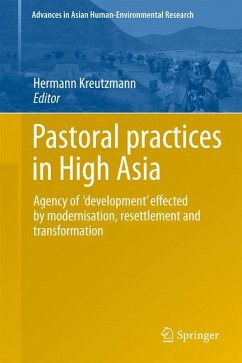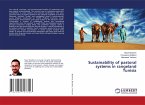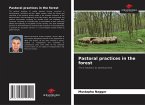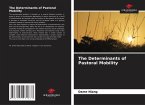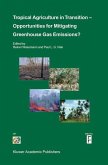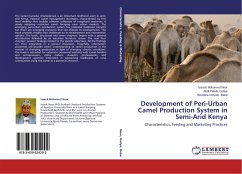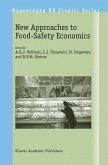In conventional views, pastoralism was classified as a stage of civilization that needed to be abolished and transcended in order to reach a higher level of development. In this context, global approaches to modernize a rural society have been ubiquitous phenomena independent of ideological contexts. The 20th century experienced a variety of concepts to settle mobile groups and to transfer their lifestyles to modern perceptions. Permanent settlements are the vivid expression of an ideology-driven approach. Modernization theory captured all walks of life and tried to optimize breeding techniques, pasture utilization, transport and processing concepts.
New insights into other aspects of pastoralism such as its role as an adaptive strategy to use marginal resources in remote locations with difficult access could only be understood as a critique of capitalist and communist concepts of modernization. In recent years a renaissance of modernization theory-led development activities canbe observed. Higher inputs from external funding, fencing of pastures and settlement of pastoralists in new townships are the vivid expression of 'modern' pastoralism in urban contexts. The new modernization programme incorporates resettlement and transformation of lifestyles as to be justified by environmental pressure in order to reduce degradation in the age of climate change.
Hinweis: Dieser Artikel kann nur an eine deutsche Lieferadresse ausgeliefert werden.
New insights into other aspects of pastoralism such as its role as an adaptive strategy to use marginal resources in remote locations with difficult access could only be understood as a critique of capitalist and communist concepts of modernization. In recent years a renaissance of modernization theory-led development activities canbe observed. Higher inputs from external funding, fencing of pastures and settlement of pastoralists in new townships are the vivid expression of 'modern' pastoralism in urban contexts. The new modernization programme incorporates resettlement and transformation of lifestyles as to be justified by environmental pressure in order to reduce degradation in the age of climate change.
Hinweis: Dieser Artikel kann nur an eine deutsche Lieferadresse ausgeliefert werden.
From the reviews: "The volume focusses on pastoral systems from the perspective of the social sciences and anthropology, with most chapters taking a case study approach. ... The book ends with a discussion of the central questions of land rights and pressure on common pastures and on the role of the state and of the pastoralist communities themselves in determining their own futures. It is a useful and timely overview of pastoral systems in the region today." (Sarah Robinson, Pastoralism, Vol. 3 (3), 2013)
"This edited volume addresses a highly important and so far rather neglected issue, namely the ongoing transformation processes affecting pastoral communities in the mountainous regions of Inner and Central Asia. ... this volume on pastoralists in High Asia is a very welcome contribution to our knowledge on this part of the world, and a tentative look into its future. ... offers a lot of interesting data and food for thought." (Professor Peter Finke, Nomadic Peoples, Issue 19, 2015)
"The volume focusses on pastoral systems from the perspective of the social sciences and anthropology, with most chapters taking a case study approach. ... The book ends with a discussion of the central questions of land rights and pressure on common pastures and on the role of the state and of the pastoralist communities themselves in determining their own futures. It is a useful and timely overview of pastoral systems in the region today." (Sarah Robinson, Pastoralism, Vol. 3 (3), 2013)
"The volume focusses on pastoral systems from the perspective of the social sciences and anthropology, with most chapters taking a case study approach. ... The book ends with a discussion of the central questions of land rights and pressure on common pastures and on the role of the state and of the pastoralist communities themselves in determining their own futures. It is a useful and timely overview of pastoral systems in the region today." (Sarah Robinson, Pastoralism, Vol. 3 (3), 2013)

